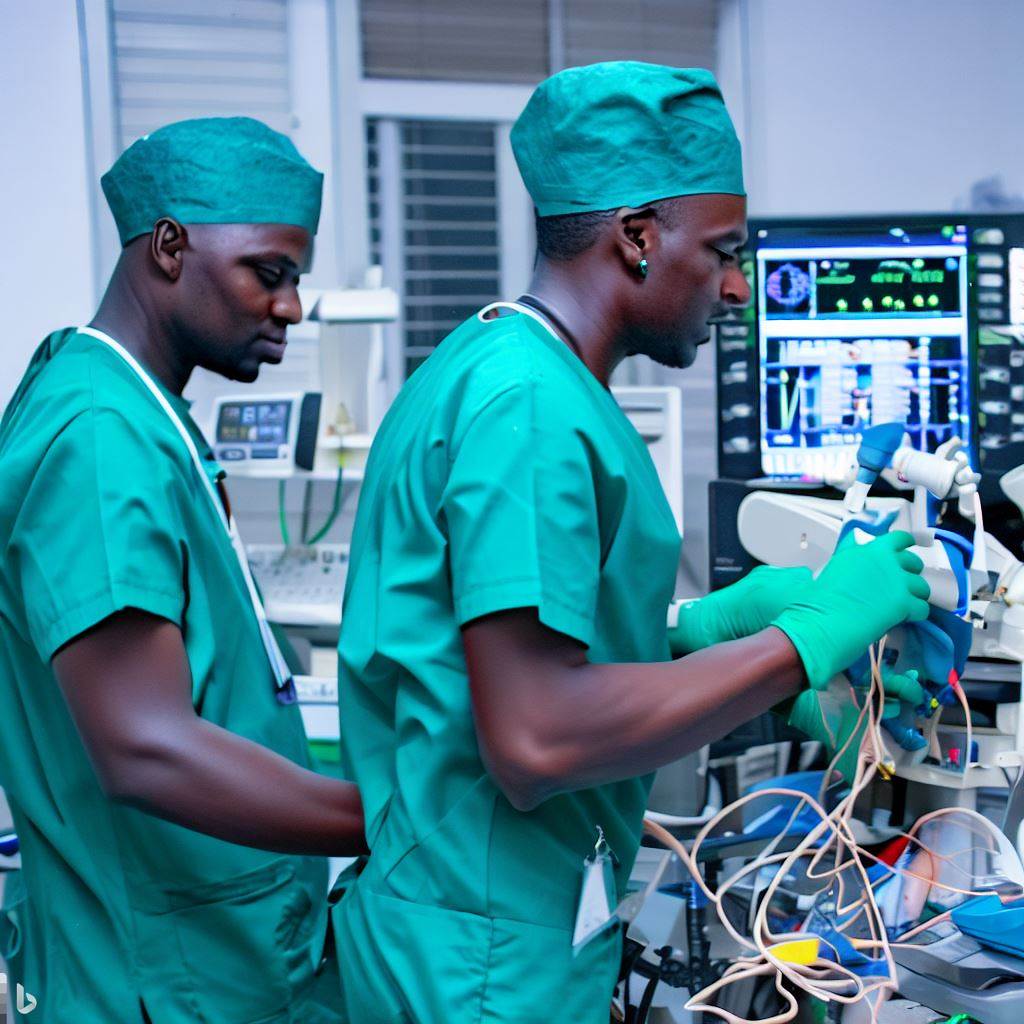Introduction
Cardiovascular technology refers to the use of medical devices and procedures to diagnose and treat heart and blood vessel diseases. It plays a crucial role in healthcare by aiding in accurate diagnosis and effective treatment of cardiovascular conditions.
Nigeria, like many other developing countries, faces several challenges in the field of cardiovascular technology. Limited availability and access to advanced equipment, trained professionals, and infrastructure hinder the implementation and expansion of cardiovascular services in the country.
Moreover, the high cost of cardiovascular technology and procedures make them inaccessible to a significant portion of the population, further exacerbating the healthcare disparities in Nigeria.
The lack of adequate funding and investment in research and development also hampers the growth and advancement of cardiovascular technology in the country.
Despite these challenges, Nigeria has significant prospects in the field of cardiovascular technology. With increasing awareness about heart disease prevention, rising healthcare expenditure, and a growing pool of healthcare professionals, the country has the potential to develop a robust cardiovascular technology sector.
Furthermore, collaborations with international organizations and partnerships with developed countries can facilitate knowledge transfer, technology exchange, and capacity building.
These efforts can help overcome the challenges and enhance the prospects of cardiovascular technology in Nigeria, leading to improved cardiovascular care and outcomes.
Basically, while Nigeria faces several challenges in the field of cardiovascular technology, there are also promising prospects for its growth and development.
Addressing the existing barriers and investing in infrastructure, education, and research can help overcome these challenges and ensure the widespread availability and accessibility of cardiovascular technology in the country.
Read: Aviation Training Schools in Nigeria: A Review
Challenges of Cardiovascular Technology in Nigeria
Limited access to advanced technology and equipment
One major challenge is the limited access to advanced cardiovascular technology and equipment. This arises primarily due to a lack of funds for procurement and insufficient infrastructure.
Without adequate financial resources, hospitals and healthcare facilities struggle to acquire state-of-the-art technology, hindering the delivery of quality cardiovascular care.
- Lack of funds for procurement: The cost of acquiring advanced cardiovascular technology and equipment is exorbitant.
Many hospitals in Nigeria do not have the necessary funds to purchase and maintain state-of-the-art machines, such as CT scanners and cardiac catheterization laboratories. - Insufficient infrastructure: In addition to financial constraints, inadequate infrastructure further compounds the challenge of limited access to advanced technology.
Hospitals lacking proper facilities and infrastructure cannot accommodate the installation and functioning of sophisticated cardiovascular technology.
Read: Challenges and Solutions in Nigeria’s Social Work Practice
Shortage of skilled healthcare professionals
Another significant challenge in Nigeria’s cardiovascular technology sector is the shortage of skilled healthcare professionals. This shortage impedes the delivery of quality care and further strains the already burdened healthcare system.
- Inadequate training programs: The scarcity of training programs specializing in cardiovascular technology hampers the development of skilled professionals.
Limited opportunities for specialized training translate into a deficit of qualified individuals capable of operating and maintaining advanced cardiovascular technology. - Brain drain to developed countries: Nigeria experiences a brain drain of healthcare professionals to developed countries, such as the United States and the United Kingdom.
The allure of better opportunities and higher salaries abroad leaves the country with a reduced pool of skilled cardiovascular technologists.
Read: Top Institutions to Study Phlebotomy in Nigeria
High cost of cardiovascular technology services
The high cost of cardiovascular technology services poses a significant burden on patients and limits access to essential care.
- Financial burden on patients: Many patients in Nigeria face financial constraints that prevent them from affording expensive cardiovascular procedures and treatments. As a result, they are unable to access the necessary technology and experience adverse health outcomes.
- Limited insurance coverage: Insurance coverage for cardiovascular technology services is limited in Nigeria, further exacerbating the financial burden on patients. Inadequate coverage restricts access to necessary treatments and hinders the overall advancement of cardiovascular care.
Ultimately, Nigeria confronts significant challenges in the realm of cardiovascular technology. The limited access to advanced technology and equipment, shortage of skilled healthcare professionals, and high cost of services hinder the delivery of optimum cardiovascular care.
Addressing these challenges is crucial to improving outcomes and ensuring better access to essential technology and treatment for cardiovascular patients in Nigeria.
Read: Balancing Work-Life in the Aviation Industry of Nigeria

Prospects of Cardiovascular Technology in Nigeria
Prospects for cardiovascular technology in Nigeria are promising and offer hope for improved healthcare outcomes. The following factors contribute to the positive outlook:
Increasing government support and investment
The Nigerian government has recognized the need to enhance the healthcare infrastructure and has undertaken initiatives to improve it.
This includes the construction and refurbishment of healthcare facilities, procurement of modern medical equipment, and the training of healthcare professionals.
Such investments are crucial for the advancement of cardiovascular technology and better patient care.
- Initiatives to improve healthcare infrastructure: The government has been actively working on enhancing healthcare infrastructure, with a focus on constructing and upgrading hospitals and medical centers across the country.
This leads to better access to cardiovascular care, including diagnosis, treatment, and rehabilitation. - Funding for research and development: The government has allocated funds to support research and development in cardiovascular technology. This enables local scientists and institutions to conduct innovative studies, develop new medical devices, and improve existing treatments.
This investment is vital for driving advancements and keeping pace with global trends.
Collaboration with international organizations and partners:
Collaboration with international organizations and partners is crucial for the growth and development of cardiovascular technology in Nigeria.
- Exchange programs for training healthcare professionals: International organizations provide opportunities for Nigerian healthcare professionals to receive specialized training in advanced cardiovascular technology.
This knowledge exchange enhances their skills and updates them on the latest practices, enabling them to deliver better care to patients. - Joint ventures for technology transfer: Nigeria can benefit from partnering with international organizations and companies to transfer advanced cardiovascular technologies.
Joint ventures allow for knowledge and technology transfer, improving access to cutting-edge equipment, diagnostic tools, and treatment options.
Growing awareness and focus on preventive healthcare
There is a growing recognition of the significance of preventive healthcare in Nigeria. This shift in focus is crucial in combating cardiovascular diseases.
- Importance of early detection and prevention: Emphasis is being placed on the early detection of cardiovascular diseases and the implementation of proactive measures to prevent their occurrence.
Regular health check-ups, screening programs, and public awareness campaigns are key components of early detection and prevention efforts. - Promoting healthy lifestyles: Nigeria is witnessing a rise in the promotion of healthy lifestyles involving regular physical activity, nutritious diet choices, and stress management. Encouraging individuals to adopt these practices reduces the risk factors associated with cardiovascular diseases and improves overall heart health.
Essentially, the prospects of cardiovascular technology in Nigeria are bright. Efforts made in increasing government support and investment, collaboration with international organizations and partners, and the growing focus on preventive healthcare are paving the way for improved cardiovascular care and outcomes.
Read: The Impact of COVID-19 on Aviation Jobs in Nigeria
Successful Case Studies in Cardiovascular Technology in Nigeria
Nigeria has made significant strides in implementing cardiovascular technology to improve patient care.
Establishment of specialized cardiovascular centers
The establishment of specialized cardiovascular centers has transformed patient care in Nigeria. Patients now have access to state-of-the-art facilities and specialized expertise.
Centers like Lagos Executive Cardiovascular Centre offer a wide range of cardiovascular treatments, including surgeries and interventions. The center has significantly improved patient outcomes and survival rates.
Patients receive timely interventions and comprehensive care, resulting in better overall health outcomes.
Telemedicine in remote areas
Telemedicine has played a crucial role in providing access to cardiovascular specialists in remote areas. Patients no longer have to travel long distances to receive consultations and expert advice.
Through telemedicine, remote patients can easily connect with healthcare professionals for immediate medical attention. Teleconsultations have reduced healthcare disparities, especially for individuals in underserved regions.
Patients in remote areas now have equitable access to high-quality healthcare services.
To summarize, successful case studies in cardiovascular technology implementation highlight the positive impact it has on patient care in Nigeria. Specialized cardiovascular centers and telemedicine have transformed the healthcare landscape, improving outcomes and reducing disparities.
These successes serve as examples of further advancements in cardiovascular technology in the country.
Read: The Role of Technology in Nigeria’s Aviation Careers
Conclusion
The challenges and prospects of cardiovascular technology in Nigeria are significant. Nigeria faces a shortage of skilled cardiovascular professionals and a lack of advanced technology in the healthcare system.
However, there are also promising prospects, including the growing interest in cardiovascular medicine and the potential for technological advancements.
Addressing these challenges is crucial for improved cardiovascular care in Nigeria. With a focus on training and education, healthcare professionals can be equipped with the necessary skills to address cardiovascular issues.
Additionally, investing in advanced technology will ensure accurate diagnosis and effective treatment. It is important for stakeholders and policymakers to recognize the significance of cardiovascular technology and continue to invest and support its advancements in Nigeria.
This includes financial support, research funding, and infrastructure development. By doing so, Nigeria can improve the quality of cardiovascular care and reduce the burden of cardiovascular diseases in the country.
On a final note, the challenges and prospects of cardiovascular technology in Nigeria are vast, but with the right approach and investment, Nigeria can make significant progress in the field of cardiovascular care.




